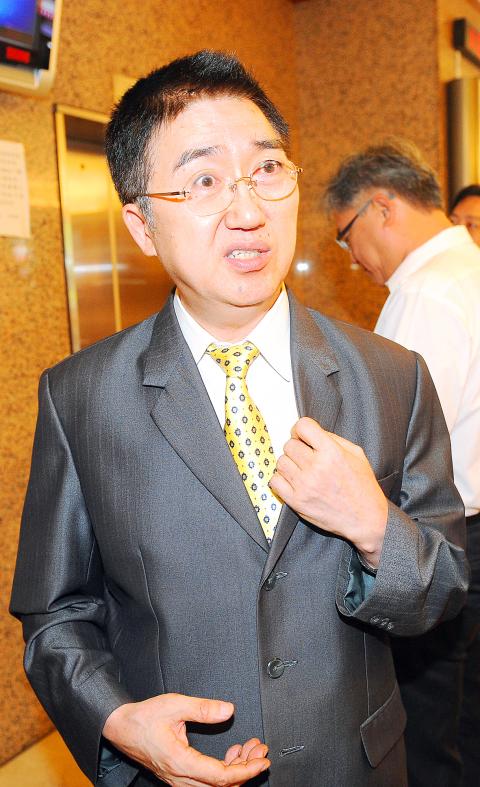Chinese Nationalist Party (KMT) caucus whip Lin Hung-chih (林鴻池) tendered his resignation yesterday after 11 of the 29 Control Yuan nominees recommended by the Presidential Office were rejected by the legislature, where the KMT holds a majority.
At press time last night, it had not been confirmed whether President Ma Ying-jeou (馬英九) accepted Lin’s resignation. Ma, who is also the KMT chairman, is widely expected to ask Lin to stay in his post for the next round of nominations to fill the 11 slots.
Lin yesterday said that as the “frontline commander,” he was taking responsibility for the unexpected outcome of the vote.

Photo: Wang Min-wei, Taipei Times
Lin and the KMT caucus blamed outgoing Control Yuan President Wang Chien-shien (王建煊) for the “surprising outcome” on Tuesday night, after it became clear that KMT lawmakers had failed to vote in line with the party’s wishes.
Not only was incoming Control Yuan president Chang Po-ya’s (張博雅) nomination confirmed by only a hair’s breadth, 11 of the 27 candidates for Control Yuan members were voted down by the legislature, despite Ma’s insistence on a “complete passage that leaves no one behind.”
At a press conference held immediately after the votes had been tallied, Lin said that Wang’s accusations of wrongdoing — including accepting gifts — by incumbent members affected the vote for those seeking a second term.

Photo: Wang Min-wei, Taipei Times
Lin said he respected the outcome of the vote, but regretted that “some of nominees did not have enough time to clear the doubts against them.”
Meanwhile, KMT headquarters laid the blame on the Democratic Progressive Party (DPP), with KMT Culture and Communications Committee Director Fan Chiang Chi-tai (范姜基泰), saying late on Tuesday that the disappointing outcome was a result of the DPP’s “deliberate fabrication of false information about some nominees.”
Chang, the new helmswoman of the Control Yuan, visited Legislative Speaker Wang Jin-pyng (王金平) and the two party caucuses yesterday.
Asked about the low support she garnered, she said it was “the product of political wrestling.”
Chang also expressed her concern about the operation of the institution when DPP caucus whip Ker Chien-ming (柯健銘) called on Ma not to submit a new list of nominees to fill the 11 positions.
She said it would be harder to impeach officials given the current number of members.
Ker said it was a problem that could be easily fixed.
“What matters now is to rebuild the institution’s image. Ma’s next round of nominees would not be the best choice and they would be nominated just for the sake of being nominated,” Ker said.
Presidential Office spokesperson Ma Wei-kuo (馬瑋國) said Ma would have a new list of nominees before the next legislative session starts.

Taiwan is projected to lose a working-age population of about 6.67 million people in two waves of retirement in the coming years, as the nation confronts accelerating demographic decline and a shortage of younger workers to take their place, the Ministry of the Interior said. Taiwan experienced its largest baby boom between 1958 and 1966, when the population grew by 3.78 million, followed by a second surge of 2.89 million between 1976 and 1982, ministry data showed. In 2023, the first of those baby boom generations — those born in the late 1950s and early 1960s — began to enter retirement, triggering

ECONOMIC BOOST: Should the more than 23 million people eligible for the NT$10,000 handouts spend them the same way as in 2023, GDP could rise 0.5 percent, an official said Universal cash handouts of NT$10,000 (US$330) are to be disbursed late next month at the earliest — including to permanent residents and foreign residents married to Taiwanese — pending legislative approval, the Ministry of Finance said yesterday. The Executive Yuan yesterday approved the Special Act for Strengthening Economic, Social and National Security Resilience in Response to International Circumstances (因應國際情勢強化經濟社會及民生國安韌性特別條例). The NT$550 billion special budget includes NT$236 billion for the cash handouts, plus an additional NT$20 billion set aside as reserve funds, expected to be used to support industries. Handouts might begin one month after the bill is promulgated and would be completed within

The National Development Council (NDC) yesterday unveiled details of new regulations that ease restrictions on foreigners working or living in Taiwan, as part of a bid to attract skilled workers from abroad. The regulations, which could go into effect in the first quarter of next year, stem from amendments to the Act for the Recruitment and Employment of Foreign Professionals (外國專業人才延攬及僱用法) passed by lawmakers on Aug. 29. Students categorized as “overseas compatriots” would be allowed to stay and work in Taiwan in the two years after their graduation without obtaining additional permits, doing away with the evaluation process that is currently required,

IMPORTANT BACKER: China seeks to expel US influence from the Indo-Pacific region and supplant Washington as the global leader, MAC Minister Chiu Chui-cheng said China is preparing for war to seize Taiwan, Mainland Affairs Council (MAC) Minister Chiu Chui-cheng (邱垂正) said in Washington on Friday, warning that Taiwan’s fall would trigger a regional “domino effect” endangering US security. In a speech titled “Maintaining the Peaceful and Stable Status Quo Across the Taiwan Strait is in Line with the Shared Interests of Taiwan and the United States,” Chiu said Taiwan’s strategic importance is “closely tied” to US interests. Geopolitically, Taiwan sits in a “core position” in the first island chain — an arc stretching from Japan, through Taiwan and the Philippines, to Borneo, which is shared by